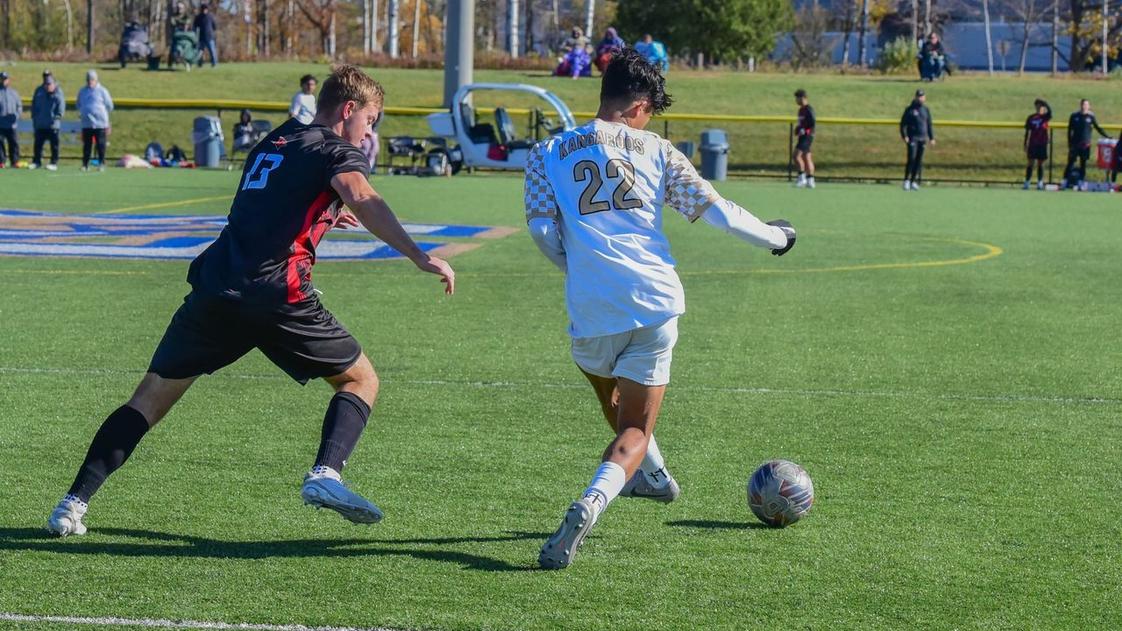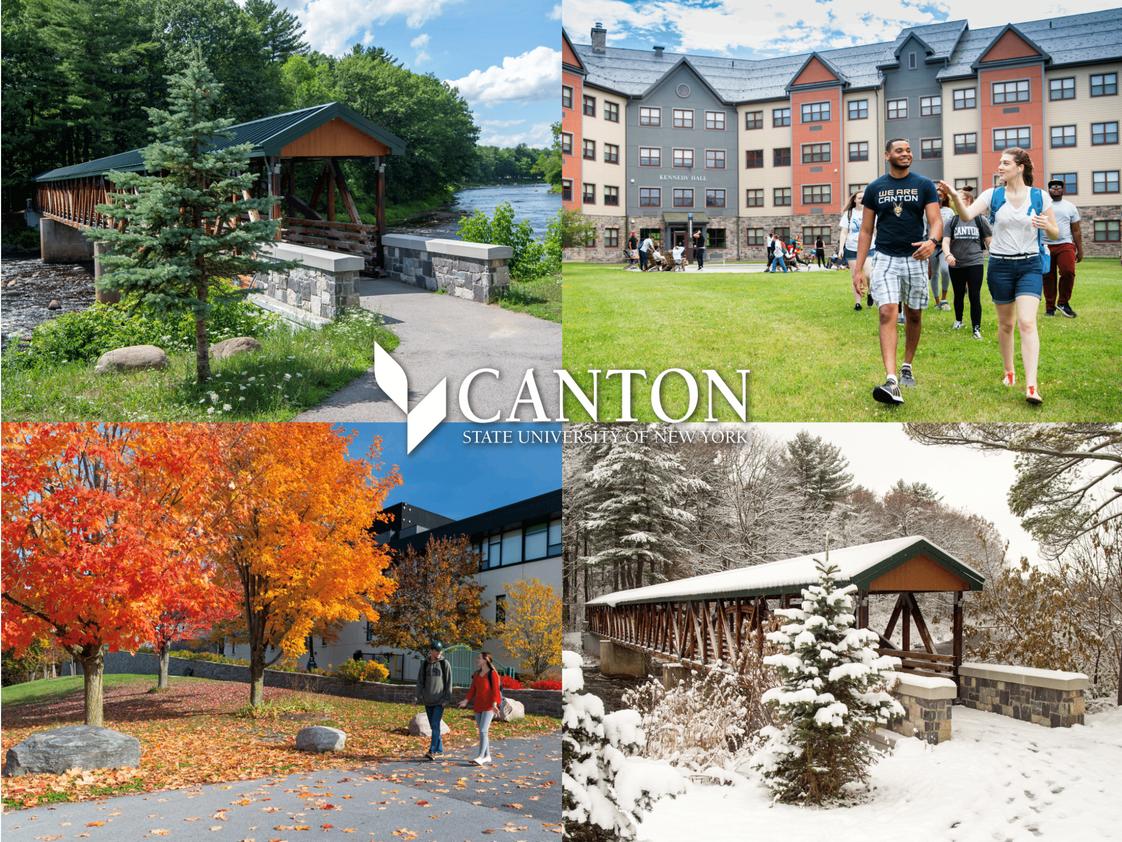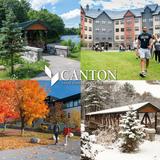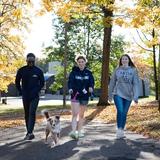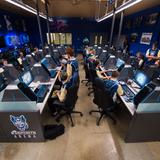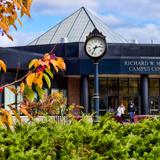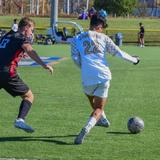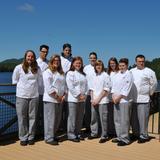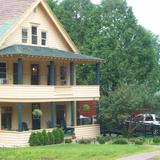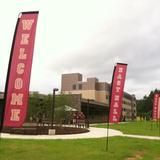- SUNY Canton College of Technology, a comprehensive, residential college in the State University of New York system, prepares students in a safe and supportive environment in a way that celebrates success and discourages failure. The College serves a culturally diverse statewide audience and educates people for responsible membership in an ever changing technological society. The college offers 1-year certificate, 2-year Associate degree, and 4-year Bachelor degree programs, many of which provide online offerings.
School Highlights
SUNY College of Technology at Canton serves 2,861 students (82% of students are full-time).
The college's student:teacher ratio of 6:1 is lower than the state community college average of 13:1.
Minority enrollment is 34% of the student body (majority Hispanic and Black), which is less than the state average of 62%.
Quick Stats (2025)
- Enrollment: 2,861 students
- In-state tuition: $7,070
- Out-state tuition: $11,900
- Acceptance Rate: 95%
- Student:teacher ratio: 6:1
- Minority enrollment: 34%
- Source: Verified school update
Upcoming Events
School Overview
The teacher population of 444 teachers has stayed relatively flat over five years.
SUNY College of Technology at Canton
(NY) Community College Avg.
Carnegie Classification
Baccalaureate/Associate's Colleges
Baccalaureate/Associate's Colleges: Mixed Baccalaureate/Associate's
Institution Level
4 or more years
At least 2 but less than 4 years
Institution Control
Public
Private not-for-profit
Total Faculty
444 staff
158 staff
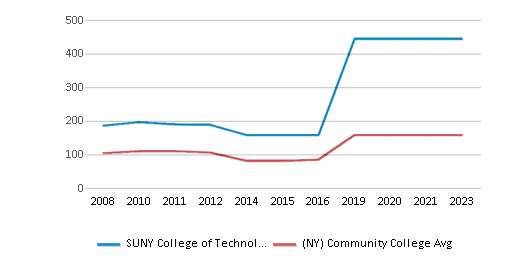
Number of Programs Offered
52
20
School Calendar
Student Body
The student population of SUNY College of Technology at Canton has declined by 11% over five years.
The student:teacher ratio of 6:1 has decreased from 7:1 over five years.
The SUNY College of Technology at Canton diversity score of 0.54 is less than the state average of 0.76. The school's diversity has stayed relatively flat over five years.
Total Enrollment
2,861 students
746 students
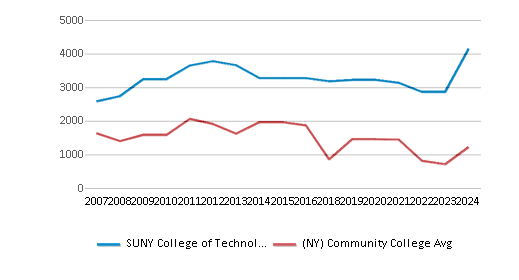
Student : Teacher Ratio
6:1
13:1
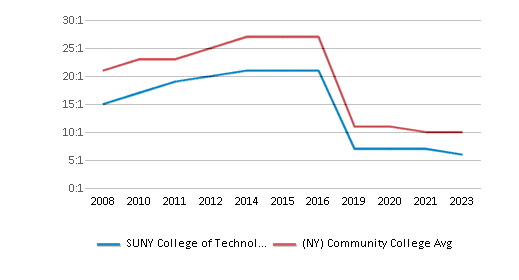
# Full-Time Students
2,347 students
519 students
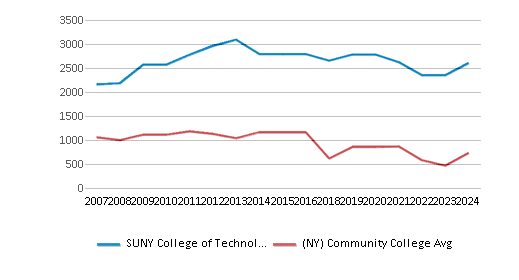
# Part-Time Students
514 students
514 students
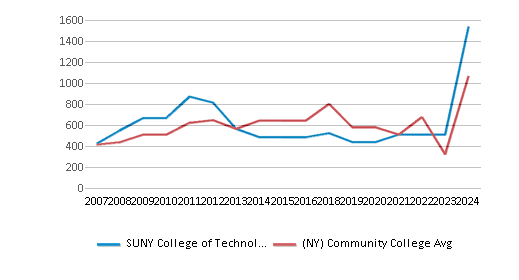
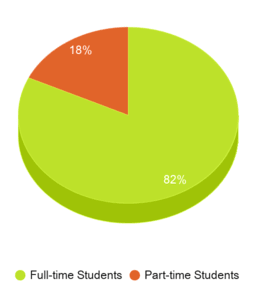
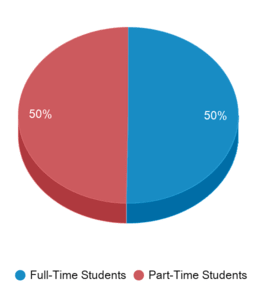
# Enrollment Undergraduate
315 students
357 students
# Full-Time Undergraduate Students
2,861 students
502 students
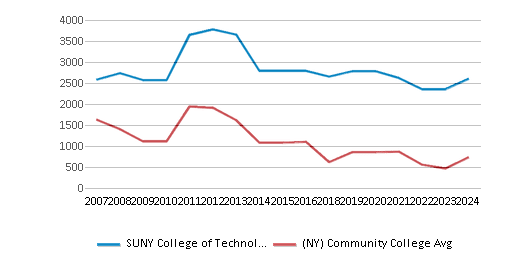
# Full-Time Graduate Students
n/a
44 students
# Part-Time Undergraduate Students
510 students
528 students
# Part-Time Graduate Students
n/a
41 students
Total Dormitory Capacity
1,250 students
382 students
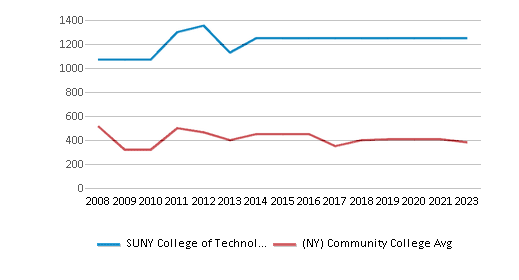
% American Indian/Alaskan
2%
n/a
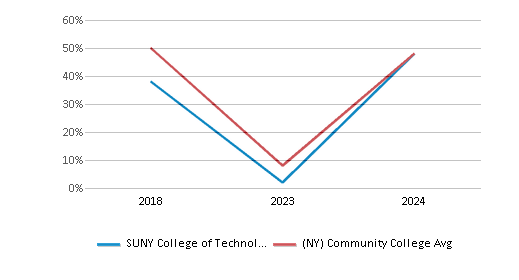
% Asian
3%
8%
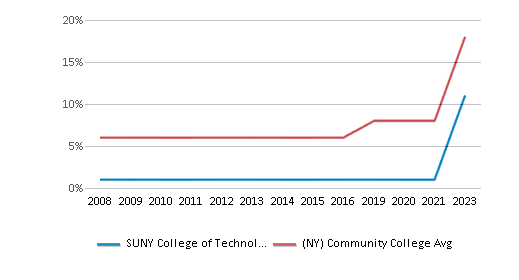
% Hispanic
12%
23%
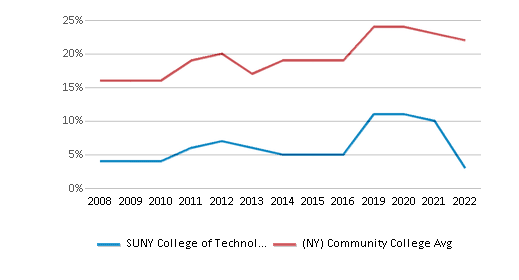
% Black
10%
18%
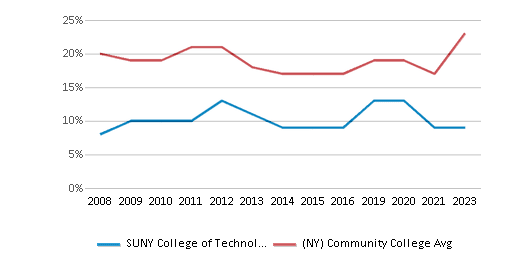
% White
66%
38%
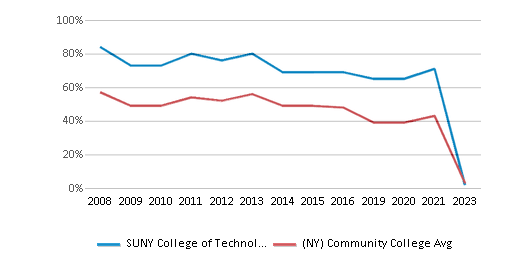
% Hawaiian
n/a
2%
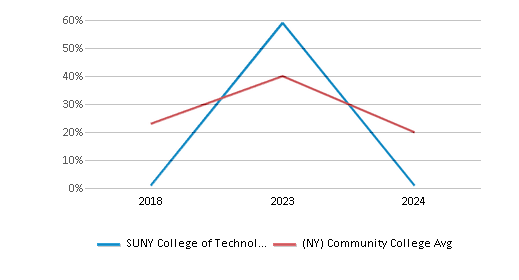
% Two or more races
3%
3%
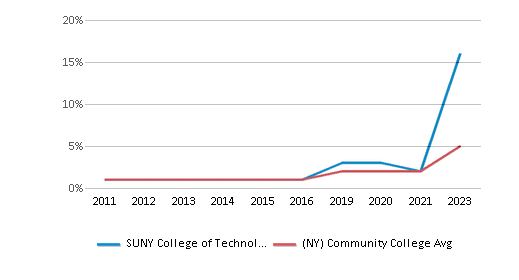
% Non Resident races
n/a
3%
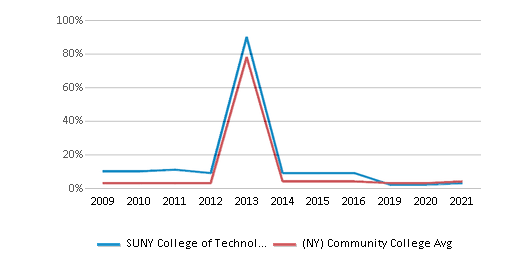
% Unknown races
3%
5%
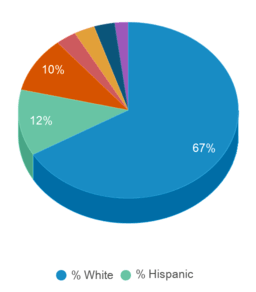
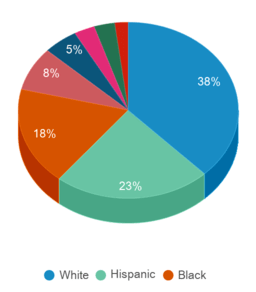
Diversity Score
0.54
0.76
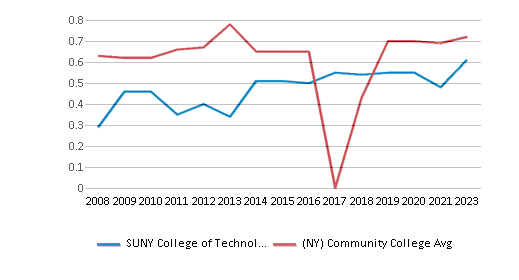
College Completion Rate (Students who graduate in less than 4 years)
n/a
0.3518%
College Completion Rate (Students who graduate in 4 years or more than 4 years)
0.3752%
0.3957%
Average Graduate Earnings (10 Years)
$37,300
$35,200
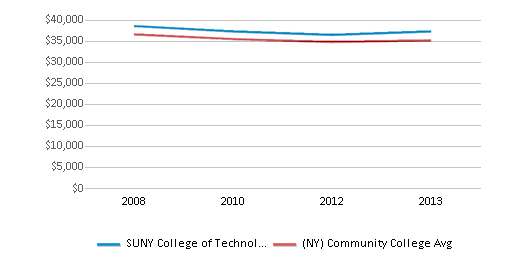
Tuition and Acceptance Rate
The public in-state tuition of $7,070 is more than the state average of $5,720. The in-state tuition has declined by 15% over four years.
The public out-state tuition of $11,900 is more than the state average of $10,320. The out-state tuition has stayed relatively flat over four years.
In-State Tuition Fees
$7,070
$5,720
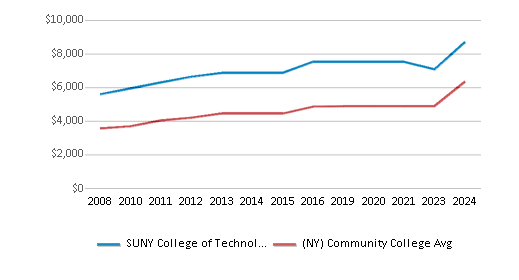
Out-State Tuition Fees
$11,900
$10,320
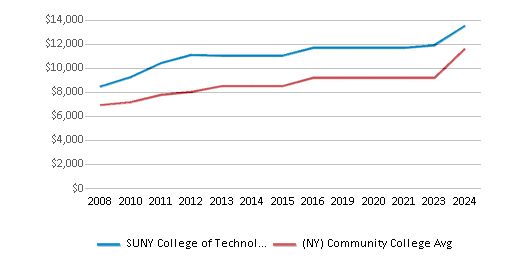
% Students Receiving Some Financial Aid
94%
88%
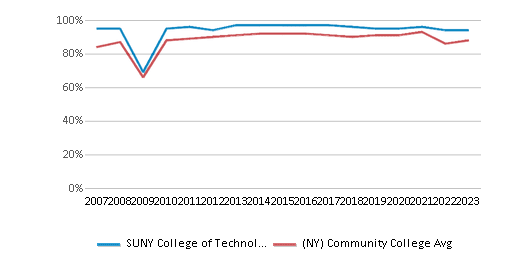
Median Debt for Graduates
$20,000
$13,841
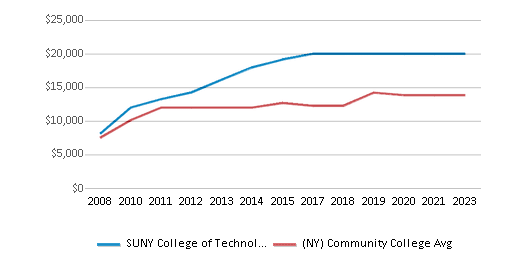
Median Debt for Dropouts
$8,134
$5,500
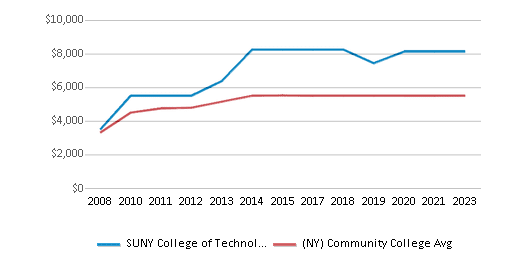
Acceptance Rate
95%
74%
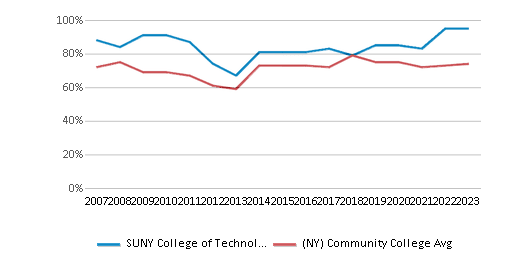
SAT Total Avg.
1,080
980
SAT Reading
540
475
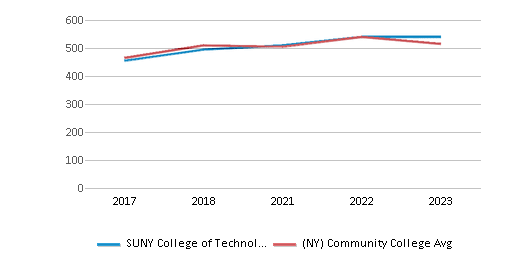
SAT Math
540
505
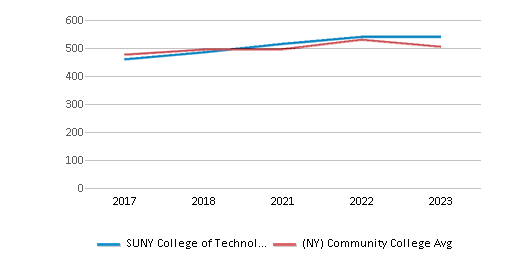
SAT Writing
n/a
485
ACT Total Avg.
58
58
ACT Composite
20
20
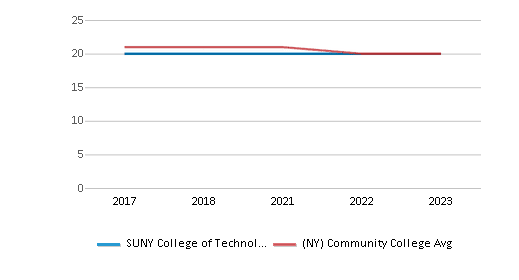
ACT English
18
18
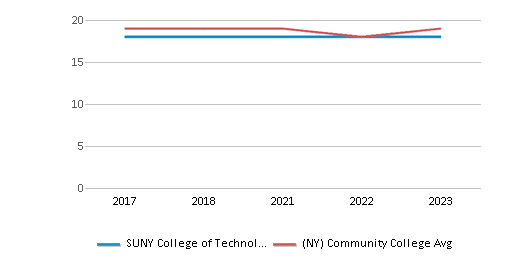
ACT Math
20
20
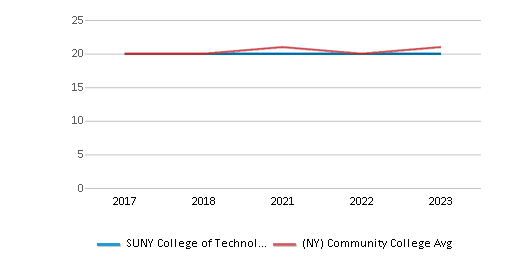
Sports
Total Sports Offered
10 sports
Sports
Baseball, Basketball, Cheering, Cross Country, Golf, Ice Hockey, Lacrosse, Soccer, Softball, Volleyball
Extracurriculars
Total ExtracurricularsTotal Extra-curric.
24 extracurriculars
ExtracurricularsExtra-curric.
Club or Organization:
African Student Union, Anime Club, ASCE, Automotive Club, Axios, Black Student Union, Caribbean United, Early Childhood Club, ECO Club, EMS, Esports, Gaming Club, Grasse Roots Literary Magazine Club, Mortuary Science Association, Nursing Student Association, Outdoor Adventure Club, Road 2 Riches, Sister 2 Sister, Society of Women Engineers, SPECTRUM, Veterinary Technician Association
Recreational Athletic Programs:
arena flag football, broomball, volleyball
African Student Union, Anime Club, ASCE, Automotive Club, Axios, Black Student Union, Caribbean United, Early Childhood Club, ECO Club, EMS, Esports, Gaming Club, Grasse Roots Literary Magazine Club, Mortuary Science Association, Nursing Student Association, Outdoor Adventure Club, Road 2 Riches, Sister 2 Sister, Society of Women Engineers, SPECTRUM, Veterinary Technician Association
Recreational Athletic Programs:
arena flag football, broomball, volleyball
Source: 2024 (or latest year available) Integrated Postsecondary Education Data System (IPEDS) , School Administrators
School Notes
- The State University of New York at Canton is a public, coeducational, residential college located on a spacious campus along the banks of the Grasse River. Its northern location places SUNY Canton close to the Adirondack Mountains, the St. Lawrence River, and major Canadian cities such as Ottawa and Montreal. Originally founded in 1906 as the School of Agriculture (SOA) at St. Lawrence University, SUNY Canton was the first postsecondary, two-year college in New York authorized by the Legislature. In 1941, SOA was renamed the New York State Agricultural and Technical Institute (ATI). ATI became a member college of the State University of New York in 1948. To recognize advanced technology programs added in the 1950's and '60's, the college underwent another name change in 1965, this time becoming the State University of New York Agricultural and Technical College at Canton, or ATC. In 1987, the University's Board of Trustees authorized yet another name change -- to the college's present designation as State University of New York College of Technology at Canton. SUNY Canton cultivates the minds of tomorrow as Northern New York's two and four-year college for technology, health, management and public service. SUNY Canton offers 30 majors leading to bachelor degrees, 20 programs leading to associate degrees, and 2 programs leading to one-year certificates. Numerous articulation agreements with other institutions provide for other opportunities in fields such as business administration, forestry and medicine. Graduates of two-year programs may either stay and continue on in one of the bachelor degree programs, transfer to another institution, or begin their career immediately. Academic facilities include eight classroom buildings, containing many specialized labs for practice in technology-based disciplines; Southworth Library, which houses more than 65,000 volumes, 6,000 microfilms, 300 periodical subscriptions and 1,500 video and audio recordings, and access to more than 25 electronic information research databases. The State University of New York at Canton is accredited by the Middle States Commission on Higher Education.
Profile last updated: 10/31/2024
Frequently Asked Questions
How much does SUNY College of Technology at Canton cost?
SUNY College of Technology at Canton's tuition is approximately $7,070 for In-State students and $11,900 for Out-State students.
What is the acceptance rate of SUNY College of Technology at Canton?
The acceptance rate of SUNY College of Technology at Canton is 95%, which is higher than the state average of 74%.
What sports does SUNY College of Technology at Canton offer?
SUNY College of Technology at Canton offers 10 interscholastic sports: Baseball, Basketball, Cheering, Cross Country, Golf, Ice Hockey, Lacrosse, Soccer, Softball and Volleyball.
Recent Articles

Obtaining Your Bachelor's Degree at a Community College
Explore the evolving landscape of community colleges offering bachelor's degrees, addressing affordability, accessibility, and workforce needs.

A to Z of Community College Certificates and Courses
From business and healthcare to technology and skilled trades, the article showcases the breadth of options available to students seeking to enhance their knowledge, develop new skills, or pursue career advancement.

What is a Community College?
This comprehensive guide explains what a community college is, its history, and its role in higher education. It covers the types of programs offered, differences from four-year colleges, benefits of attending, and important considerations for prospective students, providing valuable insights for those exploring educational options.

